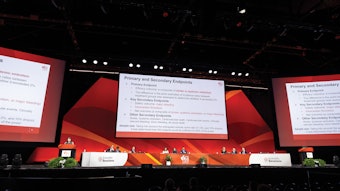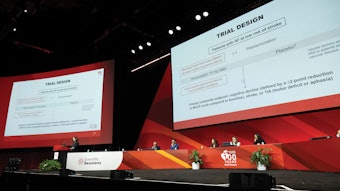Managing patients with symptomatic mitral or tricuspid regurgitation
Discussion explores the role M-TEER and T-TEER play.

Treating mitral regurgitation and tricuspid regurgitation valve disease presents an ever-changing landscape of options. But the real promise for a positive outcome is widely considered to be intervening early in the disease.
A session Sunday focused on two treatments aimed at that approach, transcatheter edge-to-edge repair (TEER) and transcatheter therapy.
The session, “Current Indications for TEER and Transcatheter Therapy in Mitral and Tricuspid Disease,” was led by, and leveraged the research of, Anita W. Asgar, MD, FRCPC, FACC, associate professor of cardiology at the University of Montreal Institute of Cardiology in Quebec. Her work in the management of valvular heart disease and cost-effectiveness analysis, as well as current studies from others, guided Sunday’s discussion.
“M-TEER and T-TEER have an important role to play in the management of patients with symptomatic MR and TR. Patient selection depends on a multidisciplinary team working together to select the optimal patients and the optimal timing for intervention,” said Asgar, who is also medical director of the structural heart program at the University of Montreal in Montreal, Quebec.
The biggest challenges of treating MR and TR disease are identifying patients who will benefit and ensuring adequate medical optimization before considering other therapies, she said. However, “we don’t live in an ideal world, and we need to do our best for patients, even if that means optimizing medications and simultaneously treating the valve disease.”
Numerous trials, most recently presented at the 2024 European Society of Cardiology (ESC), demonstrate benefits of the use of interventional therapies namely mitral and tricuspid edge-to-edge repair (TEER) with MitraClip and Triclip devices for patients with MR and TR in improving patient symptoms and quality of life, she said.
The RESHAPE-HF2 trial, involving patients with moderate to severe secondary mitral regurgitation and heart failure, randomized patients to recommended medical treatment alone or medical therapy plus mitral TEER with the MitraClip device. This trial, similar to the COAPT trial, the results of which were published in 2018, demonstrated that the addition of M-TEER to medical therapy resulted in fewer hospitalizations for heart failure and improved quality of life.
There was no mortality benefit for mitral TEER in RESHAPE-HF2, unlike the COAPT trial. However, patients had less severe disease, and overall mortality in the medical treatment arm of the RESHAPE-HF2 trial was significantly lower than in the COAPT trial (29.6% versus 46.1%). In addition, according to study authors, RESHAPE-HF2 included more patients with contemporary medical therapy and is perhaps more reflective of current medical practice.
In addition, the TRI.Fr trial in France evaluating T-TEER versus guideline-directed medical therapy for patients with tricuspid regurgitation was also presented at the 2024 ESC. This trial was consistent with the pivotal TRILUMINATE study in showing that compared with medical therapy, T-TEER resulted in reduction in valve regurgitation severity and improved quality of life.
But no trial to date of medical therapy or tricuspid valvular intervention, including replacement, has demonstrated reduced mortality or heart failure hospitalizations in right-sided valve regurgitation. Further evaluation is needed to learn whether this will be possible, Asgar said, and whether improvement in how patients feel should be the main outcome.
Current indications suggest that if mitral regurgitation is secondary and severe, despite optimal medical therapy, M-TEER would be the best course of action, she said. Additionally, T-TEER is indicated for symptomatic, severe tricuspid regurgitation despite medical therapy for relief of symptoms .
“I believe that optimal medical therapy or guideline-directed medical therapy prior to intervention is ideal, however not always realistic,” Asgar said. “Some patients cannot tolerate high doses of medical therapy but could still benefit from M-TEER which has been shown to aid in further medical therapy optimization.”











